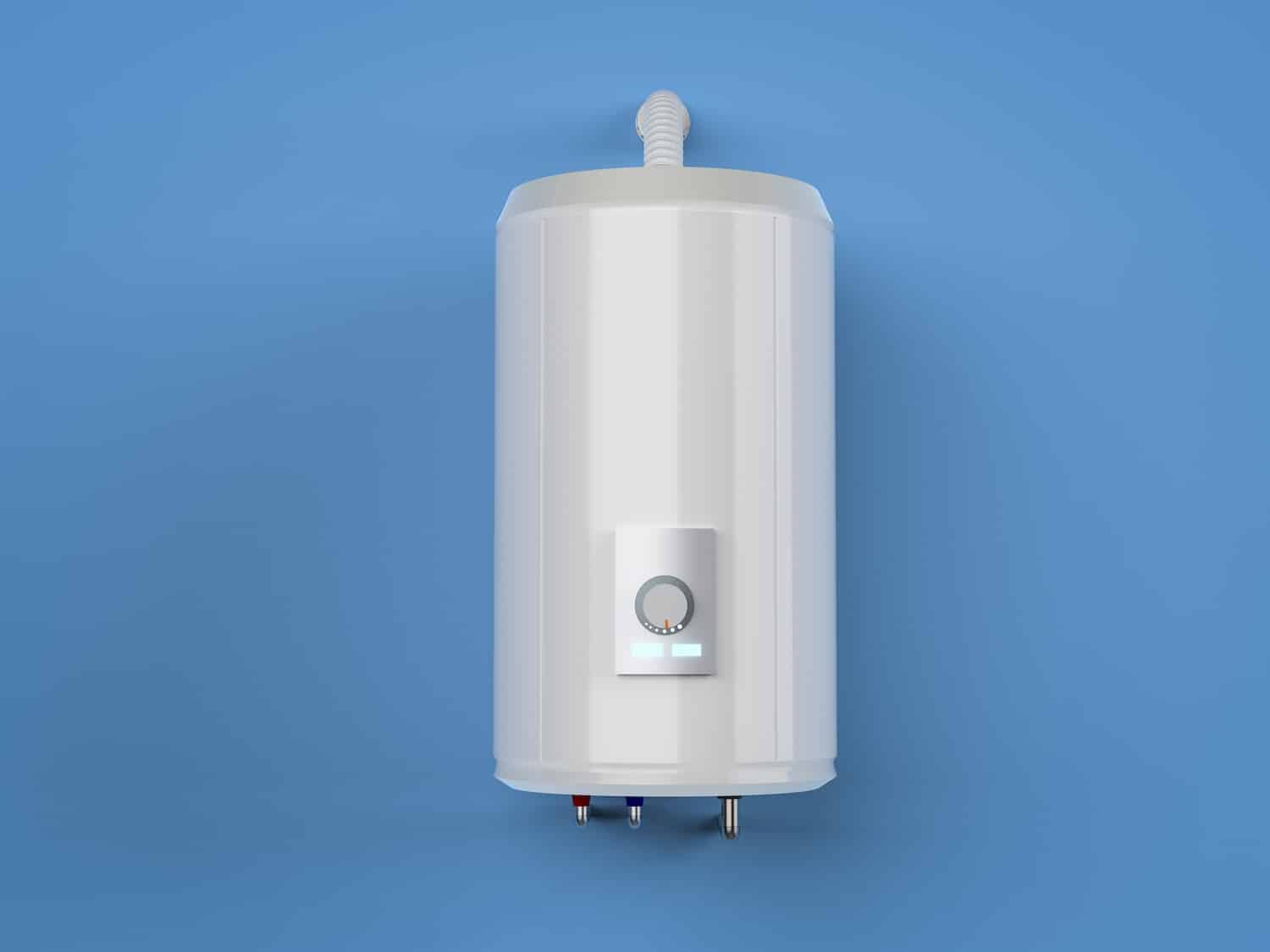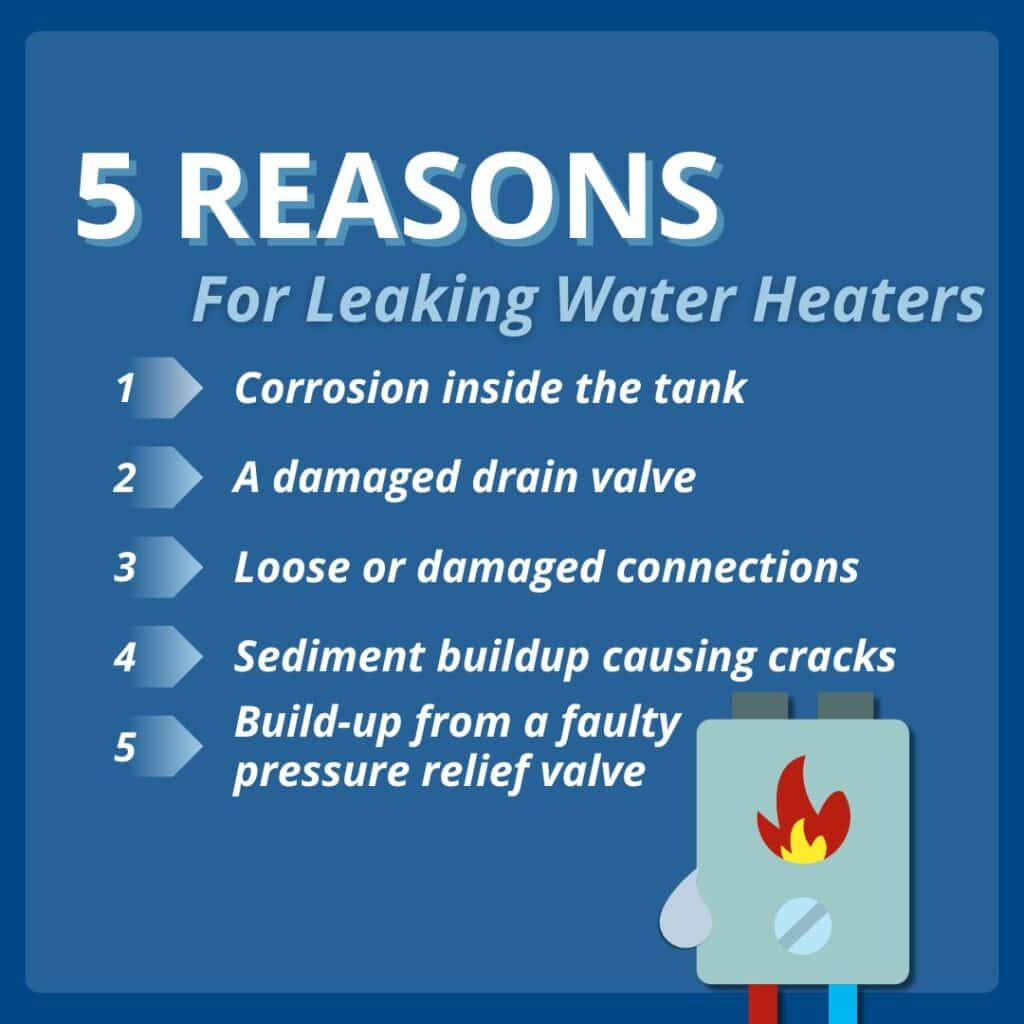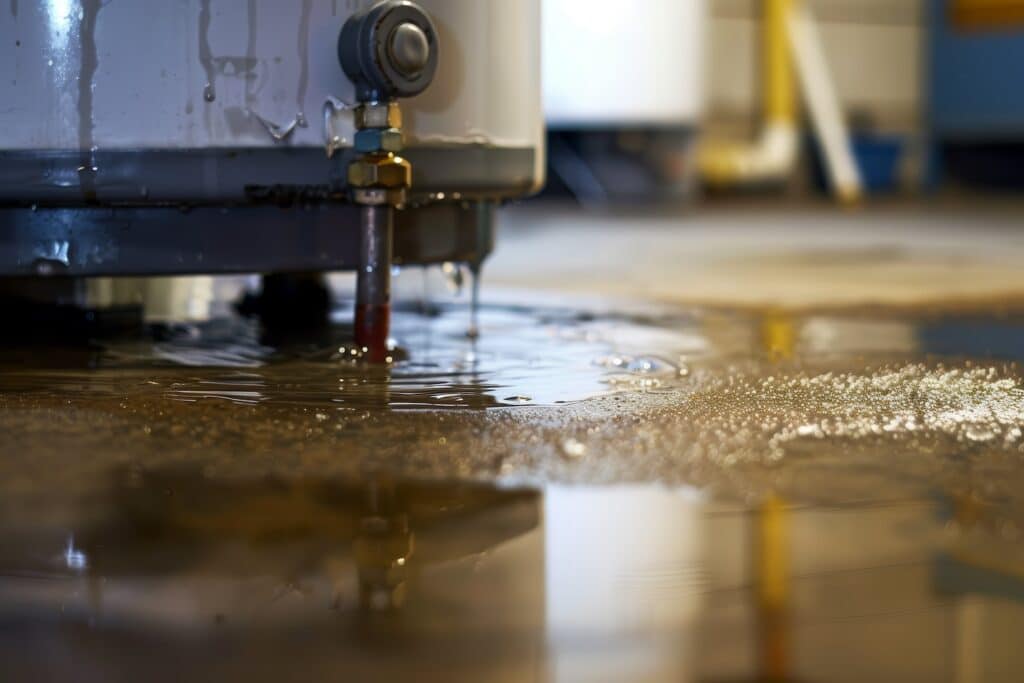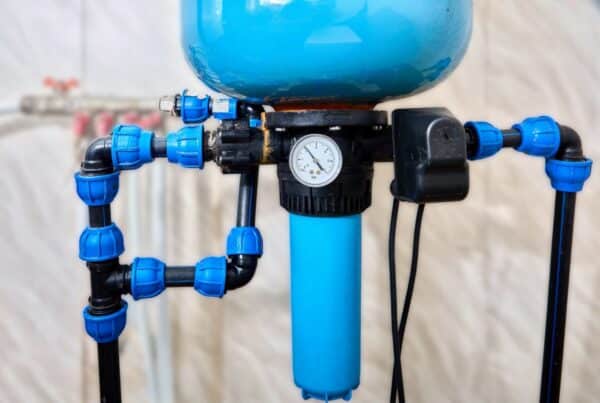
Even minor leaks can lead to water damage, higher utility bills, and a potential system breakdown if they’re allowed to continue. That’s why knowing (and addressing) what’s behind a leaking water heater is so critical and time-sensitive.
This guide walks through the most common causes of water heater leaks, the warning signs to watch for, and practical tips to prevent future issues. Whether you’re trying to stop a current leak or avoid one, you’ll find everything you need here.
Causes for a Leaking Water Heater
A leaking water heater often signals a problem that needs attention before it grows into something worse.
These are the most common reasons your water heater might be leaking:
1) Corrosion inside the tank
Water heaters are built to handle years of use, but over time, the tank’s metal lining can rust. Minerals in the water, especially in areas with hard water, speed up this process.
Once rust creates small holes in the tank, water begins to seep out.
2) Loose or damaged connections
Water flows in and out of your heater through connected pipes. If the fittings or connections around these pipes become loose or cracked, water may drip or pool near the tank.
These leaks often happen near the top or bottom of the unit.
3) Pressure build-up from a faulty relief valve
This valve releases excess pressure to keep your tank safe. However, if it malfunctions or becomes clogged with mineral buildup, it may leak water as a way to regulate the pressure. A leaking valve should never be ignored, as it could signal a pressure problem inside the tank.

4) Sediment buildup causing cracks
Over time, sediment can settle at the bottom of the tank. This buildup creates extra stress on the tank walls, which can crack and start leaking.
5) A damaged drain valve
The drain valve, located at the bottom of the tank, is used to flush out sediment during maintenance. If the valve doesn’t close tightly or becomes worn, it can drip water continuously.
Signs Pointing to a Leak
Not all water heater leaks are obvious at first glance. Some issues can start small and go unnoticed until they cause serious damage. Learning to spot the signs early can save you time, money, and frustration.
- Water pooling nearby: The most noticeable sign of a leak is water collecting around the base of the unit. Even small puddles are worth investigating, as they can indicate anything from a loose valve to a crack in the tank.
- Wet or warped floors and walls: If the leak has been ongoing, you might see damp flooring, peeling paint, or warped baseboards near the water heater.
- Rusty or discolored water: If the water coming from your faucets looks cloudy, reddish, or brown, it’s often a sign of internal corrosion in the water heater. This could mean the tank is rusting from the inside and may already have small leaks.
- Drops in water temperature: If your hot water supply runs out faster than usual or doesn’t heat properly, it could point to internal damage or sediment buildup causing inefficiency.
- Noises from the tank: Like popping, hissing, or cracking coming from the tank often signal sediment buildup or pressure issues. While these noises don’t always mean there’s a visible leak, they could indicate an internal problem that may lead to one.
- Increased utility bills: A leaking water heater works harder to heat water, leading to higher energy or water costs.
Identifying these signs early can help you act appropriately to prevent further damage. If any of these symptoms sound familiar, take a closer look at your water heater (or consider letting a professional inspect).
Preventing Leaks
While leaks are a common problem for water heaters, regular maintenance can significantly reduce the likelihood of them occurring. A few simple steps can go a long way in keeping your water heater in excellent shape:
- Flush the tank annually since sediment buildup is one of the leading causes of tank damage.
- Inspect and replace the anode rod, a metal rod inside the tank that prevents rust by attracting corrosive elements in the water. Over time, this rod wears out and needs replacement, so checking it every two to three years can prevent rust damage.
- Check the temperature settings since water heater temperature that’s too high can increase pressure in the tank, which may lead to leaks. Keep it around 120 degrees Fahrenheit!
- Look for loose connections and tighten any connections if necessary, replacing damaged parts promptly.
- Monitor water pressure, as higher pressure can put unnecessary stress on your water heater and pipes. Consider installing a pressure-reducing valve if your home’s water pressure exceeds 80 psi.
Routine maintenance like this not only prevents leaks but can also extend the life of your water heater and improve its overall performance.
After Spotting a Leak
If you notice signs of a water heater leak, acting quickly can save you from costly water damage. Follow these steps to handle the situation:
What to Do After Spotting a Leak
Discovering a water heater leak can be stressful, but taking the right steps immediately can minimize damage and prevent the issue from escalating.
First, locate the water shutoff valve on the water heater, usually found at the top of the tank where the cold water line connects. Turn the valve clockwise to stop water from flowing into the tank. If the valve is stuck or inaccessible, shut off the main water supply to your home.
For safety, disconnect the power source to avoid potential electrical hazards or further system damage:
- Electric heaters: Switch off the circuit breaker connected to the water heater.
- Gas heaters: Turn the gas control valve to the “pilot” setting or shut off the gas supply entirely.
Carefully inspect the water heater to identify the source of the leak. Focus on these areas:
- Around the base of the tank (signs of cracks or internal corrosion)
- Pipe connections at the top or bottom of the tank
- The temperature and pressure relief valve or drain valve
Then, use towels, buckets, or a wet/dry vacuum to clean up any water. This helps prevent further damage to your flooring, walls, or nearby belongings.
If the leak is severe, try to direct water into a floor drain if one is available. From there, determine if it’s safe to wait or requires urgent action. For instance:
- If the leak is coming from a loose connection or dripping valve, tightening the fittings or temporarily sealing the valve may hold until a professional arrives.
- If you notice signs of corrosion, cracks in the tank, or major water pooling, the heater likely needs immediate repair or replacement.
Even if the leak seems minor, a licensed professional can diagnose the underlying cause and recommend the best solution.
Other Water Heater Maintenance
Routine maintenance goes beyond leak prevention and plays a crucial role in keeping your water heater efficient and reliable.
Consider adding these tips to your regular home maintenance routine:
- Test the temperature and pressure relief valve once a year to ensure it’s working properly.
- Check for signs of rust or corrosion on the exterior of the tank.
- Insulate the water heater and pipes to improve efficiency and reduce energy costs, especially during colder months.
- Replace the drain valve if you notice any signs of wear or persistent dripping.

Ask an Inspector
Knowing when to call a professional is just as important as understanding the causes and signs of a water heater leak.
While some small issues can be temporarily managed, most water heater problems require the expertise of a licensed professional. If you’re unsure, here’s when it’s time to reach out to an inspector:
- The leak is coming from the tank itself
- You’re experiencing persistent issues
- There are signs of water damage
- The water heater is over 10 years old
FAQs
Small issues like a loose connection or a dripping valve can sometimes be addressed temporarily, but most water heater problems require professional attention.
Is a leaking water heater dangerous?
Yes. Leaks can lead to water damage, mold growth, and even electrical hazards. If pressure builds up inside the tank due to a malfunctioning relief valve, it could cause the tank to rupture
Can an inspector help with preventative maintenance?
Absolutely. Regular inspections not only catch small issues before they become major problems but also ensure your water heater is running efficiently.
Professionals can flush the tank, test safety features, and check for early signs of corrosion or wear.
If your water heater is leaking or showing signs of trouble, a professional inspection is the safest way to address the problem and protect your home.
Conclusion
Even with the best care or a new tank, leaks can sometimes occur. When they do, acting quickly and seeking professional help is the best way to protect your home and ensure your water heater stays in good working condition.
At Boggs Inspection Services, we specialize in helping homeowners identify water heater issues and other potential risks in their homes. If you’re dealing with a leak or want to ensure your water heater is running efficiently, we’re here to help.



